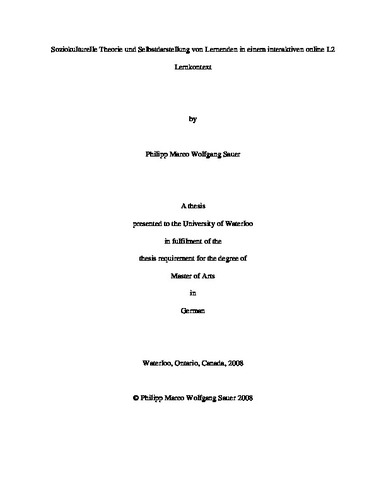| dc.contributor.author | Sauer, Philipp Marco Wolfgang | |
| dc.date.accessioned | 2008-09-12 18:34:09 (GMT) | |
| dc.date.available | 2008-09-12 18:34:09 (GMT) | |
| dc.date.issued | 2008-09-12T18:34:09Z | |
| dc.date.submitted | 2008 | |
| dc.identifier.uri | http://hdl.handle.net/10012/3981 | |
| dc.description.abstract | Abstract
This study in second language acquisition (SLA) investigates the influence of self-portrayal of language learners in an interactive online L2 learning environment from a social-interactionist research perspective. This thesis has a mainly theoretical focus and will integrate concepts of online communication with SLA methodology.
This work reviews some classical perspectives on chats and message boards as environment for online communication in chapter two and develops a list of features to classify them from a second language acquisition perspective. In order to assist the main argument of the thesis that an integrated view of learners within a learning context is necessary to fully use the advantages of an interactive online learning environment, the second language acquisition model of Marysia Johnson (2004) is discussed in chapter three. Using the premises of the model, which result from the application of Lev Vygotskys sociocultural theory and Mikhail Bakhtins dialogized heteroglossia, key features for the later data analysis are pointed out. Those are the dismissal of the separation of language competence and language performance, a view of language that exceeds mere morphosyntactical concerns and the overcoming of the mainstream mentalist SLA approach in favor of a socioculturally oriented dialogical language learning model. The approach of Bonny Norton (2000) to identity is used as an analytical framework to complete Johnsons model developing a methodology for chapter four.
The data analysis in chapter five is used to prove the validity of the model in showing that the developed model is applicable for the analysis of an online context. After a description of the course environment and a preliminary analysis, an in depth qualitative approach is used to point out the links between sociocultural theory and identity theory.
Afterwards, I will give a short summary of my most important results and finish my thesis with some suggestions for further research. | en |
| dc.language.iso | de | en |
| dc.publisher | University of Waterloo | en |
| dc.subject | CALL | en |
| dc.subject | sociocultural theory | en |
| dc.subject | Geroline | en |
| dc.subject | learner identity | en |
| dc.subject | CMC | en |
| dc.title | Soziokulturelle Theorie und Selbstdarstellung von Lernenden in einem interaktiven online L2 Lernkontext | en |
| dc.type | Master Thesis | en |
| dc.pending | false | en |
| dc.subject.program | German | en |
| uws-etd.degree.department | Germanic and Slavic Studies | en |
| uws-etd.degree | Master of Arts | en |
| uws.typeOfResource | Text | en |
| uws.peerReviewStatus | Unreviewed | en |
| uws.scholarLevel | Graduate | en |

